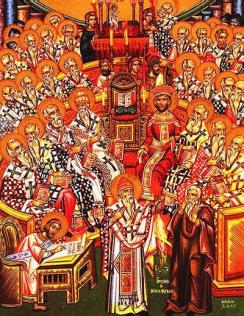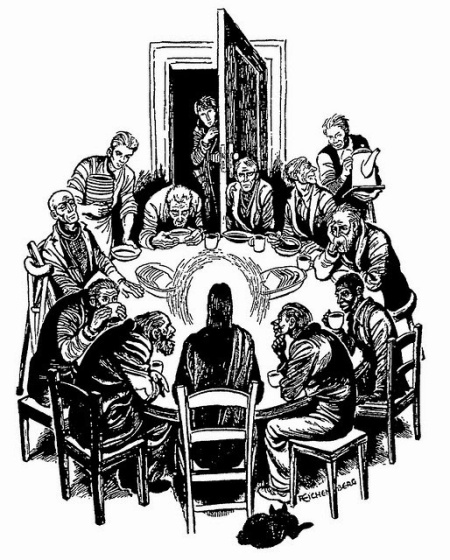A sermon for the 23rd Sunday after Pentecost, October 28, 2018
Calvary Episcopal Church, Flemington, New Jersey
Many sternly ordered him to be quiet
Bartimaeus sat by the road in Jericho where it took off toward Jerusalem. People tolerated him. They let him sit there. He  was blind and not of any use to anyone, so he sat there and they would give him tips from time to time, which was all he had to survive on. They tolerated him, and sort of felt good when they gave him alms.
was blind and not of any use to anyone, so he sat there and they would give him tips from time to time, which was all he had to survive on. They tolerated him, and sort of felt good when they gave him alms.
But there was this guy passing through town, a pretty big deal, a healer and preacher and there was a big group following him. And Bartimaeus cries out, “Son of David, have mercy on me!” This is not normal. “Son of David” was a messianic title, not a normal way to honor a person—and no one there had ever heard anything about Joseph or Mary having any descent from the royal family of Israel. Bartimaeus was a beggar because he was blind, now was he also crazy? And he shouted, and they tried to stop him—this was embarrassing. “Son of David, have mercy on me!” and Jesus stopped.
Jesus had been called extravagant things before. Demon-possessed people said he was the Son of God, and he told them to be silent. But when he heard Bartimaeus, he said, “Call him here.” Of course, all the people who had been disrespecting the beggar changed their tune and started scrambling around to look helpful.
And Jesus calls him over and he jumps up and goes to him and Jesus says, “What do you want me to do for you?” Interestingly, that’s the same question Jesus asked last week. But he was talking to James and John, two of Jesus’ inner circle, and Jesus doesn’t give them what they ask, because they asked for the preferred places, at Jesus’ right and left hands. In this case, he asks Bartimaeus, “What do YOU want?” and Bartimaeus answers, “Rabbi, I want to see.”
Realize, languages don’t always match up. The translation we have read today says, “I want to see again.” Indeed, the Greek means that—one word is translated, “see again.” But the same word is also used to mean, “look up,” as in “Jesus looked up into heaven” when he was blessing the loaves and fishes. This man wanted to see, and it certainly can be understood straightforwardly, that he was tired of being blind and sitting there by the road. Who wouldn’t be? But let’s look at what happens next. Jesus had called Bartimaeus, right? And when Bartimaeus asks to see, Jesus says, “Your faith has healed you—Go.” And where does Bartimaeus go? Does he go home, or back to his family, or looking for a job? He follows Jesus on the way.
We don’t pick this up from the lectionary, but the very next story in the Gospel of Mark is the story of Jesus’ triumphal entry into Jerusalem. Bartimaeus followed Jesus from Jericho to Bethphage and Bethany near the Mount of Olives. Holy Week, Jesus’ final week and his journey to the cross, began with crowds shouting, “Hosanna to the Son of David!” Before that, the only person in the Gospel of Mark to address Jesus as the Son of David, was the blind beggar, Bartimaeus.
He was a man of no account, and blind. Yet he had the vision to see Jesus, the Messiah. The courage to speak it aloud, when everyone around him wanted it kept quiet. The love of God that Jesus brings is costly, and it is not always comfortable. Jesus transforms this world, not by handing out and blessing power, but by healing his servants. Following Jesus on the way is not a lark, but a life of love and sacrifice. I doubt that Bartimaeus had a really clear idea of what the Son of David would be. We know that he never had seen Jesus when he first said it—he was blind when he said, “Son of David, have mercy on me.” The vision of our way forward is not clear, it is not easy, and it is not accomplished by keeping things the way they were.
“Go. Your faith has made you well.” Go where? The blind man could see that he should follow Jesus down the road, but where do we go, each of us? Or the lot of us, together as a parish? Last week, it was announced that the Rev. Nathan Ritter will be joining Calvary as its new priest in charge on November 25. Over the past year, we have walked together and listened together. We’ve listened to one another and to Jesus. We’ve joined Jesus on the road, and sometimes the way forward has seemed as obscure as it did for Bartimaeus before he heard that Jesus was approaching. But together we see Jesus in one another, in the opportunity to welcome new life, the opportunity to welcome Fr. Nathan. Jesus says, “Go your way,” and like Bartimaeus we can take that as the opportunity to follow Jesus on his way.
The difference between the blind man whose request was granted this week, and the two disciples of the inner circle whose request was not granted last week, is that those two disciples, at that moment, were asking to be put above others—expressing their anxiety for their own security in competition with others; while Bartimaeus asked simply to see. He expressed his deepest and most real need, and it was both to physically see and to see the way of God, the Kingdom of God, the road of servanthood. The one that nobody thought should have any privilege or even any rights cried out to Jesus for mercy. It didn’t matter what those with influence thought or said, Jesus gave him mercy, real mercy, real life. Jesus has mercy for each of us, real mercy, for our deepest hurts and our deepest needs. Where do we go? Jesus asks us. When we are healed, we follow him on the way of servanthood.
Almighty and everlasting God, increase in us the gifts of faith, hope, and charity; and that we may obtain what your promise, make us love what you command; through Jesus Christ our Lord, who lives and reigns with you and the Holy Spirit, one God, for and ever. Amen.
 and apostolic church” meant something very specific to the 200 or 300 bishops who gathered in the imperial palace in the lakeside town of Nicea in 325 A.D. It referred to the faith and life in the churches they represented, a faith and life that had been passed down from the apostles of Jesus. Catholic means universal—those bishops who had come together from throughout the known world recognized the unity of a universal church with universal belief and common worship. The Roman emperor Constantine had called the meeting and was in charge of the meeting, but the one authority over that Church was Christ and not a single person or institution.
and apostolic church” meant something very specific to the 200 or 300 bishops who gathered in the imperial palace in the lakeside town of Nicea in 325 A.D. It referred to the faith and life in the churches they represented, a faith and life that had been passed down from the apostles of Jesus. Catholic means universal—those bishops who had come together from throughout the known world recognized the unity of a universal church with universal belief and common worship. The Roman emperor Constantine had called the meeting and was in charge of the meeting, but the one authority over that Church was Christ and not a single person or institution. 
 who the greatest one is, they start the conversation; when they get Jesus alone, they ask for the places of honor; in one of the gospels, even their mother gets in the act, trying to get the best places for her boys. They even had a great nickname: Boanerges, which means “Sons of Thunder.” Basically we’ve got the Thunder Twins here.
who the greatest one is, they start the conversation; when they get Jesus alone, they ask for the places of honor; in one of the gospels, even their mother gets in the act, trying to get the best places for her boys. They even had a great nickname: Boanerges, which means “Sons of Thunder.” Basically we’ve got the Thunder Twins here.